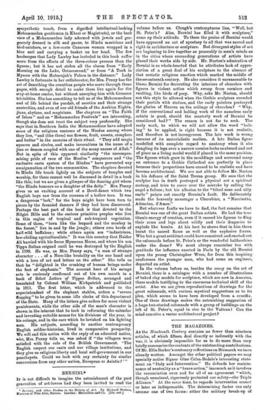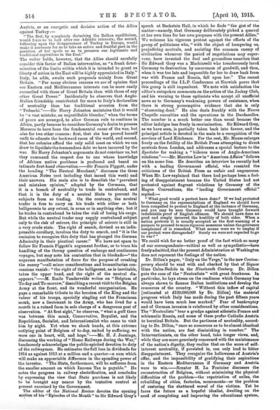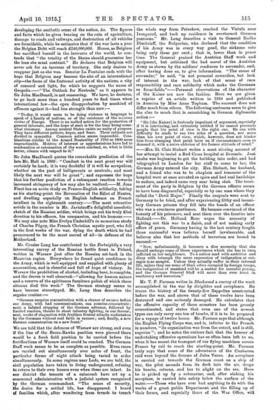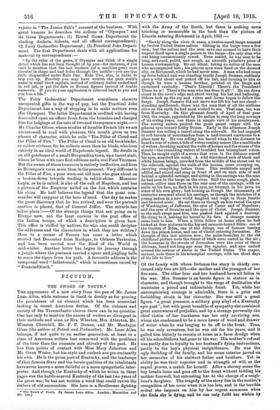THE MAGAZINES.
As the Nineteenth Century contains no fewer than nineteen articles, of which fifteen deal directly or indirectly with the war, it is obviously impossible for us to do more than very briefly summarize the contents of the outstanding contributions. Of Mr. Ellis Barker's centenary reflections on Bismarck we have already written. Amongst the other political papers we may specially notice Signor Gino Calza-Bedolo's interesting state- ment on "Italy and Intervention." He defends her mainte- nance of neutrality as a" brave action," inasmuch as it involves the renunciation once and for all of an agreement "which, though unnatural, rigorously protected our safety—the Triple Alliance." At the same time, he regards intervention sooner or later as indispensable. The determining factor can only assume one of two forms: either the military break-up of
Austria, or an energetic and decisive action of the Allies against Turkey :—
" Tho first, by completely disturbing the Balkan equilibriam, would force us to look after our Adriatic interests; the second, following upon the disappearance of Turkey in Europe, would make it neceasary for us to take an active and fruitful part in the partition of her spoils so as to preserve our legitimate and traditional aspirations in the East."
The writer holds, however, that the Allies should carefully consider this factor of Italian intervention, as "a frank deter- mination of the limits within which it is intended to grant us liberty of action in the East will be highly appreciated in Italy." Italy, he adds, awaits such proposals mainly from Great Britain, "For many obvious reasons we are of opinion that our Eastern and Mediterranean interests can be more easily reconciled with those of Great Britain than with those of any other Great Power." Incidentally he observes that Anglo- Italian friendship contributed far more to Italy's declaration of neutrality than her traditional aversion from the " Tedeschi."—Sir Harry Johnston maintains that it would be"a vast mistake, an unjustifiable blunder," when the terms of peace are arranged, to allow German rule to continue in Africa, partly because he considers Germany's desire to possess Morocco to have been the fundamental cause of the war, but also for two other reasons first, that she has proved herself unfit to educate the backward races of the world, and second, that her colonies afford the only solid asset on which we can draw to liquidate the tremendous debt we have incurred by the war. Sir Harry Johnston's arguments do not convince us, but they command the respect due to one whose knowledge of African native problems is profound and based on intimate first-hand observation,—'Sir Francis Piggott, under the heading "The Neutral Merchant," discusses the three American Notes (not including that issued this week) and their answers. His main aim is to demolish the "prevalent and mistaken opinion," adopted by the Germans, that it is a breach of neutrality to trade in contraband, and that it is the duty of a neutral State to prevent its subjects from so trading. On the contrary, the neutral trader is free to carry on his trade with either or both belligerents to any extent, in arms or in anything else ; but if he trades in contraband he takes the risk of losing his cargo. But while the neutral trader may supply contraband subject only to the risk of seizure, the principle of seizure is still in a very crude state. The right of search, devised as an indis- pensable corollary, involves the duty to search, and "it is the omission to recognize this duty that has plunged the German Admiralty in their piratical career." We have not space to follow Sir Francis Piggott's argument further, or to tram his handling of the thorny question of embargo and continuous voyages, but may note his contention that in blockade—" the supreme manifestation of force for the purpose of crushing the enemy "—all minor considerations and humanitarian con- cessions vanish: "the right of the belligerent, as is inevitable, takes the upper hand, and the right Of the neutral dis- appears."—M. Emile Vandervelde writes on "Belgium of To-day and To-morrow," describing& recent visit to the Belgian Army at the front, and its wonderful reorganization. He pays a remarkable tribute to the heroism of the King and the valour of his troops, specially singling out the Franciscan monk, now a lieutenant in the Army, who has lived for a month in a ruined farm in sole charge of a dangerous post of observation. "At first sight," he observes, "what a gulf there was between this monk, Conservative, Royalist, and the Republican. Socialist, and Internationalist who came to visit him by night. Yet when we shook hands, at this extreme outlying point of Belgium of to-day, united by suffering, we were one in heart, will, and hope."—Mi. II. J. Jennings, discussing the working of "Home Railways during the War," handsomely acknowledges the public-spirited devotion to duty of the railwaymen. He estimates the full loss in dividends for 1914 as against 1913 at a million and a quarter—a sum which will make an appreciable difference in the spending power of the investor. "The State, furthermore, will be sufferers from the smaller amount on which Income Tax is payable." He notes the progress in railway electrification, and concludes by expressing the view that State purchase is not likely to be brought any nearer by the tentative control at present exercised by the Government.
The editor of the National Review devotes the opening section of his "Episodes of the Month" to Sir Edward Grey's speech at Bechstein Hall, in which he finds "the gist of the matter—namely, that Germany deliberately picked a quarrel at her own time for her own purposes with the present Allies." We welcome his vigorous protest against the efforts of the group of politicians who, "with the object of hampering us, prejudicing neutrals, and assisting the common enemy of civilization whenever the period of negotiations may super- vene, have invented the foul and groundless assertion that Sir Edward Grey was a Machiavelli who treacherously lured Germany to destruction by assurances of goodwill, and then, when it was too late and impossible for her to draw back from war with France and Russia, fell upon her." The recent proceedings of the I.L.P. Conference at Norwich prove that this group is still impenitent. We note with satisfaction the editor's outspoken comments on the action of the Jockey Club, and his warning to those optimists who accept all unofficial news as to Germany's weakening powers of resistance, when there is strong presumptive evidence that she is only "shamming dead." He also deals frankly with the Neuve Chapelle casualties and the operations in the Dardanelles. The number is a much better one than usual because the editor indulges leas freely in recrimination. Sir Edward Grey, as we have seen, is partially taken back into favour, and the principal article is devoted in the main to a recognition of the services of Lord Kitchener. For the rest, Mr. Maxse enlarges freely on the futility of the British Press attempting to direct neutrals from London, and addresses a special lecture to the Spectator for making a "hideous mess of Anglo-American relations."—Mr. Maurice Low in" American Affairs" follows on the same line. He describes an interview he recently had with a leading Government official, who resented the criticisms of the British Press as unfair and ungenerous. When Mr. Low explained that them had perhaps been a feel- ing of disappointment because the United States had not protested against flagrant violations by Germany of the Hague Conventions, the "leading Government official" replied:—
"What good would a protest have done ? If we had protested to Germany on the representations of England we should have been compelled to protest to England at the instance of Germany, and you may be sure Germany would have brought forward indubitable proof of English offences. We should have done no good and simply incurred the hostility of both sides. When a nation protests it is usually accepted as the first warning of a purpose to proceed to more rigorous measures unless the grievance complained of is remedied. What means were we to employ if our protest were disregarded? Surely we were not expected togs to war ? "
We could wish for no better proof of the fact which so many of our correspondents—critical as well as sympathetic—have freelyadmitted, that the present Administration at Washington does not represent the feelings of the nation.
Dr. Dillon's paper, "Italy on the Verge," in the new Contem- porary should be read with and checked by that of Signor Gino Calza-Beclolo in the Nineteenth Century, Dr. Dillon puts the case of the " Neutralists " with great frankness. In partindar, he lays stress on the readiness which Germany has always shown to finance Italian institutions and develop the resources of the country. "Without this inflow of capital [eatimated at £120,000,000 by Dr. Dillon] the material progress which Italy has made during the past fifteen years would have been much leas marked." Fear of bankruptcy and of German invasion is reinforced by other considerations. The "Neutralists "bear a grudge against atheistic France and schismatic Russia, and some of them prefer Catholic Austria to heretical Britain. But the partisans of neutrality, accord- ing to Dr. Dillon," once so numerous as to be almost identical with the nation, are fast diminishing in number." The Interventionists, on the other hand, take longer views, and, while they are more genuinely concerned with the maintenance of the nation's dignity, they realize that on the score of self- interest neutrality, if persisted in, can only lead to bitter disappointment. They recognize the hollowness of Austria's offer, and the impossibility of gratifying their aspirations in the Eastern Mediterranean if Germany and Austria were to win,—Senator H. La Fontaine discusses the reconstruction of Belgium, without minimizing the physical difficulties of the problem—the repatriation of exiles, the rebuilding of cities, factories, monuments—or the problem of restoring the shattered mord of the victims. Yet he faces the future as a hopeful idealist, dwelling on the need of completing and improving the educational system,
developing the aesthetic sense of the nation, des. The figures and facts which he gives bearing on the ruin of agriculture, damage to roads and railways, and destruction of all vehicles are formidable, while he estimates that if the war lasts a year the Belgian Debt will reach £240,000,000. Hence, as Belgium has sacrificed herself in the interests of the world, he con- tends that "the totality of the States should guarantee her the loan she must contract." He declares that Belgium will never ask for an increase of territory. She only desires to reappear just as she was. Senator La Fontaine ends with the hope that Belgium may become the site of an international city—the focus of the fraternal activity of the nations, a city of concord and light, for which he suggests the name of Geopolis.—" The Outlook for Neutrals," as it appears to Sir John MacDonell, is not reassuring. We have, he declares, to go back more than a hundred years to find times when international law—the open disapprobation by mankind of offences against it—had less strength than now:—
" To-day, it would seem to be doing violence to language to speak of a family of nations, or of the existence of the maxima civitas of Europe. There is no united action for the protection of general interests, and the hope of such is for the time being some- what visionary. Among neutral States exists no unity of purpose. They have different policies, hopes, and fears. Their subjects are divided in sympathy. Common action 'seems impossible. Com- binations similar to the Armed Neutrality of 1780 or 1800 seem impracticable. Motives of interest or apprehensions have led to condonation or extenuation of the worst conduct, or, what is little better, silence with respect to it."
Sir John MacDonell quotes the remarkable prediction of the late Mr. Hall in 1889 "Conduct in the next great war will certainly be hard; it is very doubtful if it will be scrupulous, whether on the part of belligerents or neutrals; and most likely the next war will be great"; and expresses the hope that his farther prediction of a subsequent reaction towards increased stringency of law may also be realized.—M. Jean Fillet has an acute study on Franco-English solidarity, taking as his starting-point the Revocation of the Edict of Nantee, and dwelling especially on English influence on French intellect in the eighteenth century—The most attractive article in the number is Mr. JarintzoKs delightful anecdotic sketch of the Russian soldier, which brings out his truly filial devotion to his officers, his compassion, and his humour.-- We may also note Miss Evelyn Underhill's in memoriam study of Charles Peguy, the French Christian mystic poet, who fell in the first weeks of the war, dying the death which he had pronounced to be the most sacred of all—in defence of the Motherland.
Mr. Crozier Long has contributed to the Fortnightly a very interesting survey of the Russian battle front in Poland, written in Warsaw just after the Russian set-back in the Ifasurian region. Everywhere he found quiet confidence in the Army, which is well equipped and supplied with plenty of ammunition, and is cheerful and full of hope of victory. In Warsaw the prohibition of alcohol, including beer, is complete, and the decree is well observed—" allowing for human nature and a reserve of the spirituous furniture polish of which three citizens died this week." The German strategy seems to have "become stereotyped. Mr. Long thus describes the regular routine :— " German surprise concentration with a chance of success before our Army, with had communications, can counter-concentrate; next, a belated stopping of the German advance, followed by limited reaction, thanks to stout infantry fighting, in our favour; neat, weeks of stagnation with fruitless frontal attacks undertaken by the Germans without real faith in success and, finally, a new German concentration on a new front."
We are told that the defences of Warsaw are strong, and even if the line of the Bsnra-Rawka position were pierced there would be a fresh field position to be carried before the fortifications of Warsaw itself could be reached. The German Staff work seems to be as complete as possible. Even rases are carried out simultaneously over miles of front, the particular forms of night attack being varied to order simultaneously. In some regions near Lodz, we are told, the civil population have taken to living underground, refusing to return to their own homes even when these are intact. In one district the tenants of a catacomb have set up a communal administration with a judicial system recognized by the German commandant. "The sense of security, the desire for a settled life, has disappeared. I heard 0/ families which, after wandering from trench - to trench
the whole way from Petrokow, reached the "Vistula near Ivangorod, and took up residence in overturned German pontoons." Mr. Long describes a visit to General Radko Dimitrieff, the Bulgarian, who declared that the condition of his Army was in every way good, the sickness rate being only three per cent.; that is, lower than in peace time. The General praised the Austrian Staff work and equipment, but criticized the bad moral of the Austrian Army as shown by the soldiers' readiness to surrender, and, after having done so, to give information. "The cause of surrender," he said, "is not personal cowardice, but lack of interest in the war, lack of that sense of race responsibility and race solidarity which make the Germans so formidable."—Personal observations of the character of the Kaiser are now the fashion. Here we are given a reprint of an article written in 1910 and published in America by Miss Anne Topham. The account does not differ much from others. The following sentences seem to give the clue to much that is astonishing in German diplomatic action
"Re [the Kaiser] is furiously impatient of argument, especially if it is convincing, and extremely nettled if he cannot persuade people that his point of view is the right one. He can with difficulty be made to see two sides of a question, nor mere than his own point of view, which, however, does not hinder him from changing that point later en if circumstances seem to demand it, with a naive oblivion of his former attitude of mind." —Mrs. St. Clair Stobart writes a most stirring account of her attempt to instal a Red Cross hospital at Brussels. Just as she was beginning to get the building into order, and had telegraphed to London for her staff to come to her, the German Army entered the city. Mre. Robert, her husband, and a friend who was to be chaplain and treasurer of the hospital were at once arrested as spies and had real hardships to endure, and indeed came very near being shot. The treat- ment of the party in Belgium by the German officers seems to have been disgraceful, especially so by one man whom they called the "Devil Major." Finally the suspects were sent to Germany to be tried, and after experiencing filthy and insani- tary German prisons they fell into the hands of an officer who was a courteous gentleman. He became convinced of the honesty of his prisoners, and sent them over the frontier into Holland.—Dr. Holland Rose urges the necessity of fighting out this war to a finish, and of not making early offers of peace. Germany having in the last century fought three successful wars believes herself invulnerable, and believes also that her methods of terrorism are bound to succeed "Now, unfortunately, it becomes a dire necessity that she should undergo some of those experiences which oho has in turn inflicted on her neighbours. To a nation mad with ambition and diary with triumph the mere expression of indignation at out- =gee is as naught. 'Unless they actually suffer in their internal life, unless they see some of their cities occupied by foreign troops, the indignation of mankind will be a matter_for scornful jesting, and the German General Staff will more than ever trust in machinery and terrorism."
Mr. T. F. Farman writes in Blackwood a survey of the work accomplished in the war by dirigibles and aeroplanes. He traces the history of the twenty-five Zeppelins constructed before the war, and shows that of these twelve have been destroyed and one seriously damaged. He calculates that the offensive capacity of these monsters has been grossly overestimated, and states that even one of the newest types can only carry one ton of bombs, if it is to be prepared for a voyage of twelve hours. Mr. Farman says that although the English Flying Corps was, and is, inferior to the French in numbers, "its organization was from the outset, and is still, superior "; and he notes the curious fact that the honour of undertaking offensive operations has so often been left to us, when it has meant the transport of our flying machines across France by rail to reach the starting-point. Mr. Farman truly says that some of the adventures of the Cuxhaven raid were beyond the dreams of Jules Verne. An aeroplane is carried out towards the German coast on a ship of war, the pilot ascends from its deck into the air, drops his bombs, returns, and has to alight on the sea. Hero he is picked up by a submarine, and, after sinking his aeroplane, is carried into safety below the surface of the water.—Those who have ever had anything to do with the works of a great public Department and the filling up of their forms, and especially those of the War Office, will
rejoice in " The Junior Sub's" account of the business. With great humour he describes the actions of "Olympus" and its three Departments (1) Round Game Department (in- cluding dockets, indents, and all official correspondence); (2) Fairy Godmother Department ; (3) Practical Joke Depart- ment. The first Department deals with all applications for material by correspondence:—
" By the rules of the game, if Olympus can think of a single detail which has not been thought of by you—for instance, if you omit to mention that the lost washers (of a machine gun) were circular in shape and bad holes through the middle—you are ipso facie disqualified under Rule One. Rule Two, also, is liable to trip you up. Possibly you may have written the pack mule's name in small block capitals, instead of ordinary italics underlined in red ink, or put the date in Roman figures instead of Arabic numerals. If you do your application is referred back to you and you lose a life."
The Fairy Godmother Department sometimes showers unexpected gifts in the way of pay, but the Practical Joke Department has a way of stepping in to make matters even (for Olympus). The latter Department is credited with having descended upon an officer fresh from the trenches and charged him for lodgings at the rate of two and threepence a night.— Mr. Charles Oliver, whose studies of humble French life we are accustomed to read with pleasure, this month gives us two phases of character, which he calls "The Pillar of Cloud and the Pillar of Fire." The Pillar of Cloud is an old bookbinder, or rather Virill080, for he collects more than he binds, wholives entirely in an ideal world of Napoleonic legend. He dwells in an old gatehouse of a small Burgundian town, up a turret stair, where he lives with rare first editions and a real Paul Veronese. But the owner of these treasures is entirely ineffective, and lives in Beranger's verse more than in the present. Very different is the Pillar of Fire, spoor worn-out old man who goes about on a broken-down tricycle trading in rabbit-skins. Monsieur Lapin, as he is called, is also of the cult of Napoleon, and has a picture of the Emperor nailed on the box which contains his skins. He half believes the legend that the great com- mander will reappear at the hour of need. One day he makes the great discovery that he has arrived, and over the portrait another is placed, that of General Joffre. The miracle has taken place !—Of the strange things that are going on in Europe now, not the least curious is the post office of the Indian troops, of which a description is given here. This office is staffed by natives, for who else could decipher the addresses and the characters in which they are written P Here to a corner of France has come a letter which started last December from Kasbgar, in Chinese Turkestan, and has been carried over the Roof of the World in mid-winter. Another letter has begun its journey through a jungle where the postman carried a spear and jingling bells to scare the tigers from his path. A. favourite address is the compound word "Inthetrench," which is sometimes varied by " Fransinditinch."









































 Previous page
Previous page